牛津译林英语七年级英语下册unit2neighbours知识点归纳
牛津英语七年级下册 Unit 2 Neighbours知识汇总
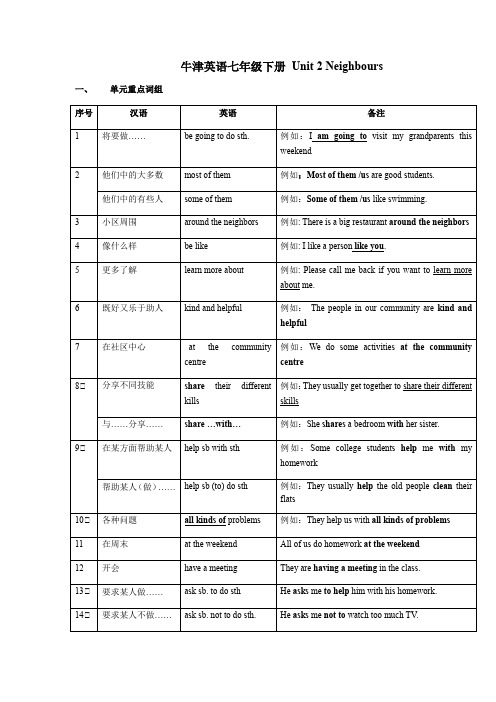
牛津英语七年级下册Unit 2 Neighbours 一、单元重点词组二、重点句型1.I'm afraid they won't welcome visitors like you. 恐怕他们不会欢迎像你这样的客人。
(1)I'm afraid 译为“恐怕”,是一种口语表达习惯,通常不用he's afraid, she's afraid.例:I'm afraid it is going to rain tomorrow. 恐怕明天要下雨了。
翻译:恐怕他下个星期不能去上学了因为他得了感冒。
补充:be afraid of sth 害怕某物我害怕蛇I'm afraid so. 我恐怕是这样的。
I‘m afraid not. 我恐怕不是这样的。
I think so. 我如此认为。
I don't think so. 我不这样认为。
★ be afraid of doing sth★ be afraid to do sth 表示“怕….. ”之意---Can I have dinner with you?我能与你共进晚餐吗?--- Sorry, I'm afraid not.这里的意思是:对不起,不能(2)visitor 派生词有visit演变(3)like 介词像与…一样/ 动词喜欢做某事2.Most of them have 14 floors.大多数楼有14层。
most的用法表示“数量上最多,最大”,为many或much 的最高级。
例:She had the most money of all of them.在这些人中,她最有钱。
most of + the/this/these/that/those/物主代词+名词,指某一范围内的多数。
(名词前面一定要有修饰词)例:Most of the students come from China. most of my booksmost of +可数名词复数+ V复most of +不可数名词+V单★most 与most of 的区别1 most+名词表泛指,无范围如:most young peopleII most of + 名词指某一范围的多数III most of +人称代词,of 不能少如:most of them两者有时可互换:Most teachers in this school are women.= Most of the teachers in this school are women.3. It’s good to live in a neighbourhood like that. 住在那样的居民区里真好。
译林版丨七年级英语下册 Unit 2 知识点总结

译林版丨七年级英语下册Unit 2 知识点总结Unit 2 Neighbours一、重点词组、句型用法1. I am afraid they won`t welcome visitors like you.我恐怕他们不会欢迎向你这样的客人。
be afraid to do sth 害怕去做某事be afraid of sth /doing sth.害怕某物/做某事be afraid+(that)从句welcome sb. 欢迎某人welcome to sp.欢迎来到某地like (prep)像He, _______his elder brother, likes chatting with others. I’m afraid so.恐怕是的。
I’m afraid not. 恐怕不是这样的。
2.It`s good to live in a neighbourhood like that. 住在那样一个小区很好。
It`s+形容词to do sth3.What are your neighbours like?= How are you neighbours?你的邻居们(性格品质)如何?What be sb/sth like?你认为…怎么样(性格品质)?(用形容词回答)What do/does sb. like?某人喜欢什么?What do/does sb. look like?某人长什么样子(外貌)?4. They often meet at the community centre and share their different skills.different +名词复数5.Some of them are volunteers.他们中有一些人是志愿者。
some/most/all of +名词/代词(名词前有限定词)one of +复数表示“……之一”Most of the water is for drinking. 大多数水都是用来喝的。
牛津译林英语七年级英语下册unit2neighbours知识点归纳 (2).docx

一、知要点1. Where are you going?你打算去哪里?be going 此“ 在行表将来”。
在行表将来主要用于表示按划或安排将要生的作,常有“意”“安排”或“打算”的含。
种在行比生,人一种期待感。
go, come, leave 等表示位移的,都可以用于在行表将来。
例如: He is going.他要走了。
I ’m coming. 我要来了。
Tom is leaving.姆要走了。
2. I’m going to vi sit our new neighbours.我打算拜我的新居。
be going to意“ 划,打算”,后接原形,用于表将来。
例如: I ’m going to wash the car if I have time.若有我想洗洗。
Where are we going to stay tonight?我今晚住哪里?3. I ’m afraid they won’t welcome visitors like you.恐怕他不会迎像你一的拜者。
(1)welcome作及物,意“ 迎’’,可与介‘to用;也可作形容,意“受迎的 " 。
如:Welcome you to our school!迎到我学校来!You’re welcome .不用。
(2)句中like是介,意“像,相似’’,其反是unlike;作,意“喜’’,后可接名或不定式作。
如:What is Jim like?吉姆个人怎么?They like playing football on Sunday.他喜在星期天踢足球。
(3)won ’t是 will与not的略形式。
“ will+原形"也是一般将来的构成之一。
如:We will take a bus to work.我将乘公共汽上班。
4. Most of them have 14 floors.most of 意“⋯⋯中的大多数”,后面接可数名复数作主,用复数形式;也可接不可数名,此用数形式。
Unit2Neighbours知识讲义牛津译林版英语七年级下册

牛津版译林英语7B知识点总结Unit2 Neighbours1.Where are you going?【知识点一】:be doing(1)现在进行时表将来(2) go、e、leave、move表示移动的词,都可以用“现在进行时表将来”(3)进行时开始表示:近期一直在做某事2. I'm afraid they won't wele visitors like you. 恐怕他们不会欢迎像你这样的客人。
(P18)【知识点一】afraid adj. 害怕的(1) I'm afraid (that) + 宾语从句, 恐怕Eg. I’m afraid (that) you are wrong.(2) be afraid of doing sth 害怕做某事= be afraid to do sth(3) I'm afraid not. 恐怕不是这样的。
Eg.—Can you get there before 6 o’clock? —I’m afraid not.(4) I'm afraid so. 恐怕是这样的。
Eg.—Is it going to rain tomorrow? —I’m afraid so.【随堂练习】1. —Will your father e to see your piano show tomorrow?— . He is having an important meeting in Beijing now.A. They'd like toB. You're rightC. I'm afraid soD. I'm afraid not2. —Would you like to help me with my lessons?—Sorry. .I have no time now .A. I'm sure.B. I'm afraid.C. I'd like.D. I hope.【知识点二】visitor (n.)拜访者①visit v. 参观;拜访n. 参观visit sp. = be on a visit to sp.②构词法:动词+or→表示人的职业或身份act→ actor invent→ inventor collect→ collector【随堂练习】1. Do you know the (visit) telephone numbers? I want to call them.【知识点三】like(1) v. 喜欢like doing sth./ like to do sth. 反义词:dislike = hate(2) prep. 像反义词:unlikebe like/look like①问性格,品质What be sb. like?Eg.—What is he like? —He is kind and helpful.②问外貌:What does sb. look like? = How does sb. look?Eg.—What does he look like? = How does he look?—He looks tall and strong.区别:What does sb like (doing)? 问爱好(3)不能单独作谓语: be like 像…look like 看起来像… sound like听起来像【随堂练习】1.The boy, his father, playing football.A. like;likesB. likes;likeC. liked;likeD. like; will like2.— __________ your hometown like? —It’s a good place ___________.A. How is; to liveB. How does; to liveC. What is; livingD. What is; to live3. What is your father like?A. He likes history best.B. He likes eating meat.B. He is kind and friendly. D. He is forty years old.补: 问职业①What be sb? ②What be sb’s job? ③What do/does sb do?3. How many buildings are there in your neighbours? 在你居民区有多少幢楼?【知识点一】how often, how many times, how soon, how long 与how far的区别【随堂练习】1. — ______ do you help your parents do housework? — Every evening.A. How oftenB. How longC. How soonD. How far2. — ______ music do you listen to every day? —One hour.A. How manyB. How longC. How soonD. How much3. — ______ hours of music do you listen to every day? —One.A. How manyB. How longC. How soonD. How much4. — ______ will you e back? —In two days.A. How oftenB. How longC. How soonD. What time4. Most of them have 14 floors. 它们大多数有14层。
牛津译林英语七年级英语下册unit2neighbours知识点归纳

一、知识要点1.Where are you going?你打算去哪里?be going此处为“现在进行时表将来”。
现在进行时表将来主要用于表示按计划或安排将要发生的动作,常有“意图”“安排”或“打算”的含义。
这种现在进行时比较生动,给人一种期待感。
go, come, leave等表示位移的动词,都可以用于现在进行时表将来。
例如:He is going. 他要走了。
I’m coming. 我要来了。
Tom is leaving. 汤姆要走了。
2. I’m going to vi sit our new neighbours.我打算拜访我们的新邻居。
be going to意为“计划,打算”,后接动词原形,用于表将来。
例如:I’m going to wash the car if I have time. 若有时间我想洗洗车。
Where are we going to stay tonight? 我们今晚住哪里?3. I’m afraid they won’t welcome visitors like you.恐怕他们不会欢迎像你一样的拜访者。
(1)welcome作及物动词,意为“欢迎’’,可与介‘词to连用;也可作形容词,意为“受欢迎的"。
如:Welcome you to our school! 欢迎到我们学校来!You’re welcome.不用谢。
(2)句中like是介词,意为“像,相似’’,其反义词是unlike;作动词时,意为“喜欢’’,后可接动名词或不定式作宾语。
如:What is Jim like? 吉姆这个人怎么样?They like playing football on Sunday.他们喜欢在星期天踢足球。
(3)won’t是will与not的缩略形式。
“will+动词原形"也是一般将来时的构成之一。
如:We will take a bus to work.我们将乘公共汽车上班。
牛津译林版七年级英语下册 Unit2 单元知识点总结
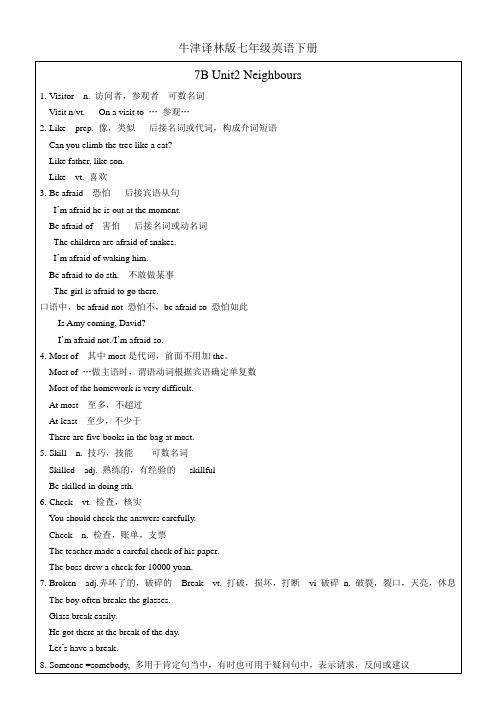
牛津译林版七年级英语下册29.Sick 与ill 做表语可互换,作定语ill表示坏的,邪恶的Sick 还可表示恶心的,想吐的30.Be busy doing sth./be busy with sth.He is busy cooking in the kitchen.What are you busy with every day?--I’m busy getting ready for my exam.31.Notice n. 布告,通知可数做不可数名词,意为注意,做动词意为注意,通知,注意到I didn’t notice you.Notice sb do sth 注意到某人做某事I noticed him cross the street.rmation 不可数名词,a piece of information 一条信息News,information 是不可数名词,而message,idea,newspaper则是可数名词33.Better adj./adv.I like green better.They will make you feel better.34.A group of 一群,一队in groups 成群,分组We often work in groups.A group of students are helping the old clean the rooms.35.Make sb. SthMake sb. Adj.Make sb. Do sth.36.Worry about sb/sth.Worried adj.担心的,忧虑的be worried about sth/sb=worry about sth/sb.He is worried about his mother.37. Be happy to do sth. 高兴做某事是be+adj.+to do sth.的结构类似单词:be+sad/glad/excited/pleased…+to do sth.We are excited to hear the news.。
译林版牛津英语七年级下册全册Unit2单元知识点及语法归纳

七年级英语下册知识点总结Unit 2 Neighbours一、重点词组、句型用法一、重点词组、句型用法1. I am afraid they won`t welcome visitors like you.我恐怕他们不会欢迎向你这样的客人。
我恐怕他们不会欢迎向你这样的客人。
be afraid to do sth 害怕去做某事害怕去做某事 be afraid of sth /doing sth.害怕某物/做某事做某事be afraid+(that)从句welcome sb. 欢迎某人迎某人 welcome to sp.欢迎来到某地欢迎来到某地like (prep)像He, _______his elder brother, likes chatting with others. I’m afraid so.恐怕是的。
恐怕是的。
I’m afraid not. 恐怕不是这样的。
恐怕不是这样的。
2.It`s good to live in a neighbourhood like that. 住在那样一个小区很好。
住在那样一个小区很好。
It`s+形容词to do sth3.What are your neighbours like?= How are you neighbours?你的邻居们(性格品质)如何?你的邻居们(性格品质)如何?What be sb/sth like?你认为…怎么样(性格品质)?(用形容词回答)?(用形容词回答)What do/does sb. like?某人喜欢什么?某人喜欢什么?What do/does sb. look like?某人长什么样子(外貌)?4. They often meet at the community centre and share their different skills.different +名词复数名词复数5.Some of them are volunteers.他们中有一些人是志愿者。
牛津译林版英语七下7B_Unit2_Neighbours_单元复习归纳_1

7B Unit2 Neighbours 默写内容(Welcome and comics)1.邻居2.参观者3.服务员4.街区5.拜访我们的新邻居6.你这样的客人7.在城市公园8.在第九大街9.在你们街区10.他们中的大多数11.---你打算去哪儿?---我打算去拜访我们的新邻居们。
12.我恐怕他们不会欢迎像你这样的访客。
13.怕……,担心……14.这个小女孩害怕在夜间外出。
15.你们街区周围有什么?7B Unit2 Neighbours 早读内容(Welcome and comics)1.邻居neighbour2.参观者visitor3.服务员waiter4.街区neighbourhood5.拜访我们的新邻居visit our new neighbours6.你这样的客人visitors like you7.在城市公园in City Garden8.在第九大街in Ninth Street9.在你们街区in your neighbourhood10.他们中的大多数most of them11.---你打算去哪儿?Where are going ?---我打算去拜访我们的新邻居们。
I’m going to visit our new neighbours.12.我恐怕他们不会欢迎像你这样的访客。
I’m afraid they won' t like the visitors like you.13.怕……,担心……be afraid of14.这个小女孩害怕在夜间外出。
This little girl is afraid of going out at night.15.你们街区周围有什么?What do you have around your neighbourhood?。
译林牛津版七年级英语下册7B Unit2 Neighbours 知识点梳理 (2)

Unit 2 Neighbors知识点一:Neighbour(英式英语)邻居;邻国=neighbor(美式英语)Neighborhood(n.)邻居;小区The neighbors in our neighbourhood are friendly .知识点二:一般现在进行时态表示将来时态瞬间性动词或趋向性动词(come;go;leave;move;arrive;get;start 等)The bus is coming. 车快来了。
I’m leaving for Russia. 我将动身前往俄罗斯。
Where are you going? 你打算去哪?----I’m going to France. 我打算去法国。
知识点三:visit. Sb.=call on Sb.拜访某人Visit Sp.=call at Sp.参观某地Many visitors visit the palace.知识点四:afraidI’m afraid they won’t welcome visitors like you.介词I’m afraid. 我害怕。
/ 很抱歉。
be afraid to do sth. 害怕去做某事be afraid of doing sth.害怕.....知识点五:How many +名词复数+.....?How much+不可数名词?How much....?(对价格提问)There are five trees in the garden.----How many trees are there in the garden?There are five trees in the garden.---What’s in the garden?There is some milk in the bottle.---How much milk is there in the bottle?知识点六:most ;all; some;many; (作代词)All of them 他们中的所有人Some of them 他们中一些人Most of them have 14 floors. 他们中的大部分(代词)Most (adv.)最这是世界上最漂亮的画。
牛津译林版七年级下册 Unit2 Neighbours 知识点总结

牛津译林版七年级下册unit2 Neighbours 1.I’m afraid they won’t welcome visitors like you.恐怕他们不会欢迎你这样的客人。
句中的like为介词,意为“像,类似,像......一样”Eg: Don’t look at me like that. 别像那样看着我。
2.I live in a flat in City Garden in Ninth Street.我住在第九大道城市花园的一个公寓里。
live in 居住在......Eg: We live in the same alley.我们住在同一条小巷里。
3.How many buildings are there in your neighbourhood?你的邻近有多少建筑物?how many (+可数名词)多少= how much (+不可数名词)Eg: How many parents do that?有多少父母能做到这样吗?How much is this worth?这值多少钱?4.There are about 20 buildings.有大约20栋建筑物。
there be 句型表示“有(某处存在某物)”have 也可表示“有(某人拥有某物)”Eg: There are some apples on the table.有一些苹果在桌上。
We have all kinds of books.我们有各种各样的书。
there be 句型的就近原则:be 动词的使用取决于be动词后最近的词为单数还是复数。
Eg: There is a book on the desk.有一本书在书桌上。
There are three books on the desk.有三本书在书桌上。
若be动词后的词为不可数名词,则be动词用单数。
Eg: There is some milk in the fridge.有一些牛奶在冰箱里。
最新最新译林版牛津英语7Bunit2-neighbours知识点讲解

Unit2 Neighbours词汇/句型1.neighbour n.邻居拼写:居民区,社区2.meet(1)vt.遇见,碰见I met him in the street.(2)vt.迎接Will you meet her at the station?[拓展]Meet with 偶然遇见On my way home, I met with an old friend.3.afraid adj.害怕,畏惧(1)be afraid to do sth害怕做某事I’m af raid to go out alone at night.(2)be afraid of doing sth害怕……I’m afraid of falling into the river.(3 )be afraid that从句,表示恐怕……I’m afraid that I can’t help you.4.like prep.(1)像,类似Lily makes a kite like a butterfly.Don’t do it like that.(2)像…一样,常用词组look likeMy brother looks like my father.5.It’s good to live in a neighbourhood like that.It是形式主语,to live in a neighbourhood是真正的主语。
句式:It is+adj+(for/of sb) to do sth6.help sb. with sth翻译:他经常帮我复习英语。
help sb (to) do sth翻译:他经常帮妈妈打扫房间。
7.翻译:我的电脑出毛病了something interesting有趣的事8.词汇:(1)checkcheck in 登记,报到check out结账离开check up核对,检查check one’s answer 检查某人的答案ask for money 要钱10.someonesomeone 某人,用于肯定句,否定结构anyone翻译:有人正在敲门。
牛津译林版七年级英语下册Unit 2 Neighbours 重难点知识归纳总结
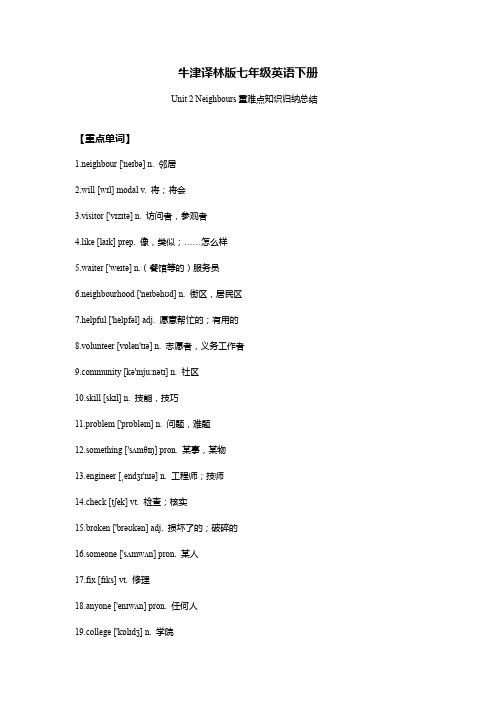
17.on the afternoon of 5 March在三月五号的下午
18.all the day整天
19.know a lot about styles and colours对风格和颜色很了解
20.be happy to give you some ideas很高兴给你一些主意
牛津译林版七年级英语下册
Unit 2 Neighbours重难点知识归纳总结
【重点单词】
1.neighbour ['neɪbə] n.邻居
2.will [wɪl] modal v.将;将会
3.visitor ['vɪzɪtə] n.访问者,参观者
4.like [laɪk] prep.像,类似;……怎么样
【重点句型】
1.I am afraid they won’t welcome visitors like you.
我恐怕他们不会欢迎像你这样的客人。
2.It’s good to live in a neighbourhood like that.
住在那样一个小区很好。
3.What are your neighbours like?
34.artist ['ɑːtɪst] n.艺术家
35.sound [saʊnd] linking v.听起来
36.sick [sɪk] adj.生病的;恶心的
37.notice ['nəʊtɪs] n.布告,通知
rmation [ˌɪnfΒιβλιοθήκη 'meɪʃən] n.信息
39.below [bɪ'ləʊ] adv.下面
5.waiter ['weɪtə] n.(餐馆等的)服务员
牛津译林版七下英语unit2neighbours知识点归纳
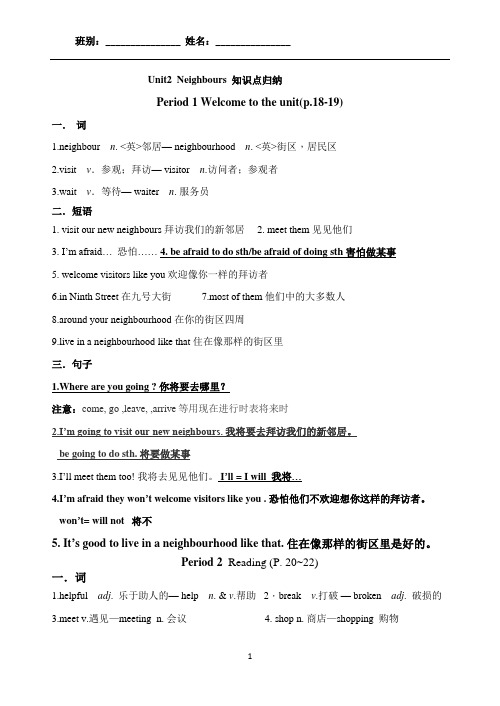
Unit2 Neighbours 知识点归纳Period 1 Welcome to the unit(p.18-19)一.词1.neighbour n. <英>邻居— neighbourhood n. <英>街区,居民区2.visit v.参观;拜访— visitor n.访问者;参观者3.wait v.等待— waiter n. 服务员二.短语1. visit our new neighbours 拜访我们的新邻居2. meet them 见见他们3. I’m afraid… 恐怕……4. be afraid to do sth/be afraid of doing sth 害怕做某事5. welcome visitors like you欢迎像你一样的拜访者6.in Ninth Street 在九号大街7.most of them 他们中的大多数人8.around your neighbourhood 在你的街区四周9.live in a neighbourhood like that 住在像那样的街区里三.句子1.Where are you going ? 你将要去哪里?注意:come, go ,leave, ,arrive等用现在进行时表将来时3.I’ll meet them too! 我将去见见他们。
I’ll = I will 我将…4.I’m afraid they won’t welcome visitors like you . 恐怕他们不欢迎想你这样的拜访者。
won’t= will not 将不5. It’s good to live in a neighbourhood like that. 住在像那样的街区里是好的。
Period 2 Reading (P. 20~22)一.词1.helpful adj. 乐于助人的— help n. & v.帮助 2.break v.打破— broken adj. 破损的3.meet v.遇见—meeting n. 会议 4. shop n. 商店—shopping 购物二.短语1.some of them 他们中的一些人2.meet at the community centre 在社区中心见面3.share their different skills 分享他们的不同技能4. help us with all kinds of problems 帮助我们解决各种的问题help sb. with sth. 帮助某人做某事5.have a “helping hands” meeting 举行“援助之手”见面会6.ask sb. (not) to do 要某人(不要)做某事7.ask someone to fix it 请某人修理它8. some college students 一些大学生9.be ready to help 乐意帮忙 be ready to do sth. 乐意做某事10.really nice 真好 11.help visit the old people 帮助看望老人12.do some shopping for them 为他们购物13.help the old people clean their flats 帮助老人打扫他们的公寓14.help the boy with his homework 帮助这个男孩做家庭作业15.fix things like broken bicycles 修理像坏了的自行车那样的物品16.need help with one’s problem 某人遇到问题需要帮助17.get help with one’s homework 某人作业得到帮助18.among the volunteers 在志愿者中二.句子1. What are your neighbours like? 你的邻居们怎么样? What be …like ? ...怎么样?2. They’re kind and helpful. 他们友好又乐于助人。
译林版英语七年级下册Unit2 Neighbours 重点词汇短语及句型 知识点背诵

U2 Neighbours重点单词与短语1.Neighbour n. [英] 邻居=[美] neighbor考点: neighbour 为可数名词,复数形式neighbours.例句: My neighbours are very friendly. 我的邻居们很热情.2.Visitor n. 采访者,参观者考点: visitor 意为”访问者,参观者”,为可数名词,多指交际商务观光或探望的访客.[归纳] 以-or结尾表示人的名词actor 男演员inventor 发明家doctor 医生translator翻译家collector收集者conductor售票员3.Like prep. 像,类似;.......怎么样辨析like,as4.Helpful adj. 愿意帮忙的;有用的固定搭配helpful in doing sth. 做某事很有帮助It’s helpful to do sth. 做某事有帮助V.help help sb. with sth.= help sb. do sth.5. community n. 社区考点community 意为”社区,社团”,为可数名词. 作主语强调整体时,谓语动词用单数;强调”社区的人”时,谓语动词用复数.例句The new arts centre will serve the whole community. 这座新的艺术中心将为整个社区服务.典型例题我们的社区很大. very large.Community 为集合名词.集合名词用来指一群人或一些事物的总称,类似的词还有police,family等.5.Skill n. 技能,技巧固定搭配skill in/at .........方面的技能develop a skill 发展技能Practical skill 实际技能with skill 非常熟练例句Reading and writing are two important skills.阅读和写作是两种重要的技能.6.Problem n. 问题,难题固定搭配have a problem 有问题deal with a problem 处理问题Fix a problem 解决问题cause a problem 引起问题例句There are still some serious problems in this street. 这条街上任然有一些严重的问题.7.Something pron. 某事,某物考点something 多用于肯定句中,作主语时,谓语动词用单数形式. something 还可用于表现说话人希望得到肯定回答的疑问句中.例句There is something wrong with my bike. 我的自行车出了点毛病.Would you like something to eat? 你想吃点什么吗?8.Check vt. 检查;核实固定搭配check in 登记check out 结账退房;调查Check on 检查,查看check off 核对,查对例句Our English teacher often checks our homework. 我们的英语老师经常检查我们的作业.Check 用作及物动词时,可跟名词,代词,从句等作宾语.中考真题I will meet Jane at the station. Please what time she will arrive.A.CountB. chooseC. checkD. catch9.Broken adj. 损坏了的;破碎的考点broken 可用于名词之前作定语或连系动词之后作表语.例句The watch is broken. 这块表坏了.10.Fix vt. 修理固定搭配fix up 修理;装饰fix on 选定,确定联fix v. 安装,使固定;确定辨析fix,repair,mend例句I fix a picture on the wall. 我在墙上装上一幅画.I must have my car repaired. 我必须把我的车修好.11.College n. 学院辨析college, university12.Lucky adj.幸运的固定搭配be lucky to do sth.很幸运做某事be sb.'s lucky day 是某人的掌运反义词:unlucky adj.不幸的联想:luck n. lucky adj. Luckily adv.13.Fire n.火固定搭配make a fire 生火start a fire 放火,纵火set fire to sth. 纵火焚烧某物be on fire 起火put out a fire 灭火fight a fire 救火例句It took firemen several hours to put out the fire.消防员花了好几个小时才把火补灭。
(牛津译林版)七年级下册英语素材:Unit 2 Neighours 重点短语句型归纳
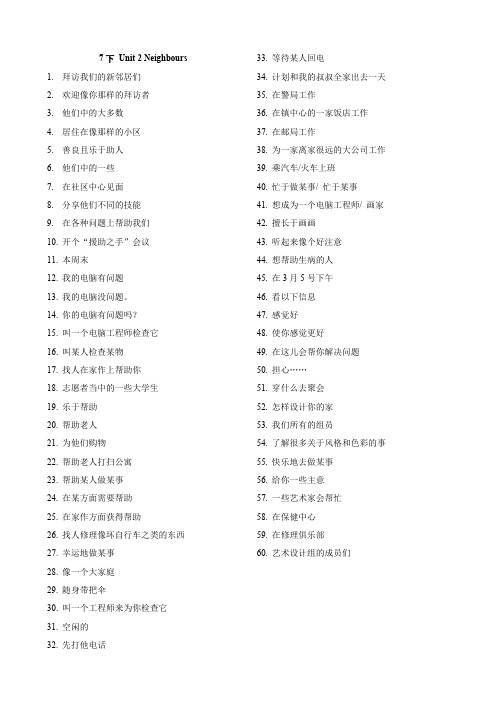
7下Unit 2 Neighbours1.拜访我们的新邻居们2.欢迎像你那样的拜访者3.他们中的大多数4.居住在像那样的小区5.善良且乐于助人6.他们中的一些7.在社区中心见面8.分享他们不同的技能9.在各种问题上帮助我们10.开个“援助之手”会议11.本周末12.我的电脑有问题13.我的电脑没问题。
14.你的电脑有问题吗?15.叫一个电脑工程师检查它16.叫某人检查某物17.找人在家作上帮助你18.志愿者当中的一些大学生19.乐于帮助20.帮助老人21.为他们购物22.帮助老人打扫公寓23.帮助某人做某事24.在某方面需要帮助25.在家作方面获得帮助26.找人修理像坏自行车之类的东西27.幸运地做某事28.像一个大家庭29.随身带把伞30.叫一个工程师来为你检查它31.空闲的32.先打他电话33.等待某人回电34.计划和我的叔叔全家出去一天35.在警局工作36.在镇中心的一家饭店工作37.在邮局工作38.为一家离家很远的大公司工作39.乘汽车/火车上班40.忙于做某事/ 忙于某事41.想成为一个电脑工程师/ 画家42.擅长于画画43.听起来像个好注意44.想帮助生病的人45.在3月5号下午46.看以下信息47.感觉好48.使你感觉更好49.在这儿会帮你解决问题50.担心……51.穿什么去聚会52.怎样设计你的家53.我们所有的组员54.了解很多关于风格和色彩的事55.快乐地去做某事56.给你一些主意57.一些艺术家会帮忙58.在保健中心59.在修理俱乐部60.艺术设计组的成员们1 我恐怕他们不会欢迎像你这样的客人。
2他们帮助我们解决各种各样的问题。
3他们经常在社区中心集中,并和大家分享各自的一技之长。
4 我的电脑出故障了。
(4种)5 我打算找个电脑工程师检查一下。
6 他们中的一些人经常会去探望老人,并为他们采购些物品。
7将来你想当什么?我要当个医生,因为我想帮助生病的人。
8你最近感觉不舒服吗?9你在为参加聚会该穿什么或者怎样设计你的家而烦恼吗?10我们住在像这样的街区里是幸运的。
(牛津译林版)七年级下册英语素材:Unit 2 Neighours

七年级下册单元要点梳理Unit 2 Neighbours一、教学目标1. To teach the students something about the neighborhood and the community centre.2. To teach the students the usage of the simple future tense.3. To teach the students to talk about one’s dreams.4. To teach the students to write a passage to introduce one’s neighbours.二、四会单词名词(n.)neighbour(neighbor) 邻居visitor 访问者community 社区skill 技能problem 问题engineer 工程师college 学院fire 火manager 经理office 办公室policeman 警察postman 邮递员station 局,所,站police station 警察局post 邮政post office 邮局person 人job 工作future 未来artist 艺术家notice 布告,通知information 信息group 组动词(v.)fix 修理check 检查情态动词(modal v.)will 将,将会shall 将,将会联系动词(linking v.)sound 听起来形容词(adj.)helpful 愿意帮忙的,有用的broken 损坏了的lucky 幸运的elder 年纪较长的sick 生病的better 更好,较好介词(prep.)like 像,类似;......怎么样不定代词(pron.)something 某事,某物anything 任何事someone 某人anyone 任何人副词(adv.)below 下面三、重点词组(短语)1. in your neighbourhood 在你们社区/邻里2. a community centre 一个社区中心3. share their different skills 分享他们的一技之长4. help sb. with sth. 帮助某人(做)某事5. be ready to do sth. 准备好做某事6. do some shopping 购物7. wait for one’s call 等某人的电话8. the day after tomorrow 后天9. plan a day out 计划一日出行10. make a fire 生火11. her elder brother/ sister 她的哥哥/姐姐12. in the future 在将来13. help sick people 帮助病人14. look at the information below 看下面的信息15. make you feel better 让你感觉身体更好16. worry about 担心17. all our group members 我们组的所有成员18. give sb. some ideas 给某人出些主意19. by train/bus/ship/bike 乘火车/公共汽车/船/骑自行车20. know a lot about 非常了解四、重要句子(句型)1. I’m going to visit our new neighbours. 我打算拜访我们的新邻居。
- 1、下载文档前请自行甄别文档内容的完整性,平台不提供额外的编辑、内容补充、找答案等附加服务。
- 2、"仅部分预览"的文档,不可在线预览部分如存在完整性等问题,可反馈申请退款(可完整预览的文档不适用该条件!)。
- 3、如文档侵犯您的权益,请联系客服反馈,我们会尽快为您处理(人工客服工作时间:9:00-18:30)。
、知识要点1. Where are you going ? 你打算去哪里?be going 此处为“现在进行时表将来”。
现在进行时表将来主要用于表示按计 划或安排将要发生的动作,常有“意图”“安排”或“打算”的含义。
这种现在 进行时比较生动,给人一种期待感。
go, come, leave 等表示位移的动词,都可 以用于现在进行时表将来。
像你一样的拜访者。
("welcome 作及物动词,意为“欢迎’’,可与介’词 to 连用;也可作形 容词,意为“受欢迎的"。
如:Welcome you to our school!欢迎到我们学校来! You' re welcome .不用谢。
(2)句中like 是介词,意为“像,相似’’,其反义词是unlike ;作动词 时,意为“喜欢’’,后可接动名词或不定式作宾语。
如:What is Jim like? 吉姆这个人怎么样?They like playi ng football on Sun day.他们喜欢在星期天踢足球。
(3) w on ' t 是will 与not 的缩略形式。
“ will+动词原形"也是一般将来时 的构成之一。
如:We will take a bus to work.我们将乘公共汽车上班。
4. Most of them have 14 floors. most of 意为“……中的大多数”,后面接可数名词复数作主语时,谓语动词用 复数形式;也可接不可数名词,此时谓语动词用单数形式。
例如: Most of them are going to Guangzhou next week.他们中的多数人都准备下星期去广州。
Most of the water is clea n. 大部分水是干净的。
【注意】most of 后的名词是单数时,谓语动词也用单数形式。
例如:Most of the apple is red.这个苹果大部分是红的。
5. There ' s something wrong with my computer . 我的电脑出故障了。
(1) 此句包含句型:There is somethi ng wrong with …(某物出毛病了/坏了。
)此句型的同义结构有:Something is wrong with ...;... is broken doesn ' t work .等。
例I ' m going to wash the car if I have time. 若有时间我想洗洗车。
例如:He is going. 他要走了。
I ' m coming.我要来了。
Tom is leav ing. 汤姆要走了。
2. I ' m going to vi sit our new neighbours .我打算拜访我们的新邻居。
be going to 意为“计划,打算”,后接动词原形,用于表将来。
Where are we going to stay toni ght? 我们今晚住哪里?3. I ' m afraid they won ' t welcome visitors like you .恐怕他们不会欢迎(2) somethi ng 是不定代词,用于肯定句或希望得到对方肯定回答的疑问句中。
在疑问句或否定句中多用anything。
当形容词修饰这类不定代词时,必须后置。
如:I have something important to tell you .我有一些重要的事情告诉你。
6.They help us with all kinds of problems .他们帮助我们解决各种难题。
help sb.with sth .意为“帮助某人解决难题'',其中with 可用动词原形来代替。
如:He often helps me learn English .他经常帮助我学习英语。
7. Someof them often visit the old people and do someshopping for them.他们中的一些人经常会去探望老人并为他们采购些物品。
do some shopp ing意为“买东西,购物",相当于go shopp ing。
在疑问句中,也用some 而不用any 。
类似结构还有:do some reading( 阅读),do some cooking( 烧饭),do some washing( 洗衣服)等。
8. You' re lucky to live in a n eighbourhood like that , Sim on. 住在像那样的居民区,你真幸运,西蒙。
lucky 是luck 的形容词形式,后接不定式,其反义词是unlucky( 不幸运的) 。
此句也可表达为:It ' s lucky for you to live in a neigh bourhood like that ,Simon. 9. People go there when they need help with their ... 当人们在... 需要帮助时,人们就去那儿(寻求帮助)。
(1) whe n 意为“当……时’’,是连词,引导时间状语从句,从句中常用一般现在时表示将来时,而主句可用一般将来时,即所谓的“主将从现''原则。
如:I ' ll go to the park when I ' m free tomorrow .当我明天有空时,我将去公园。
(2) 句中的help 是不可数名词,后面接介词with 。
如:I need help with my English .我英语需要帮助。
10.Will you wait for us to call back? 你会等我们回电话吗?(1) wait 是不及物动词,后接介词for 。
女口:Someones waiting for you under the tree .树下有人在等你。
(2) 句中to call back 是动词不定式作目的状语。
call back 意为“回电话''。
11 .My parents and I are planning a day out with my uncle ' s family the day after tomorrow .我和我父母正计划后天与叔叔全家外出一天。
(1) a day out 意为“外出一天",out是副词,修饰名词day,作后置定语。
如:the weather today 今天的天气the people there 那儿的人民(2) the day after tomorrow 意为“后天",是与一般将来时连用的时间状语。
go to work by train 意为“乘火车去上班"。
“ by+交通工具’’表示交通方式,“ go to . .. by+交通工具’’意为“乘……去某地’’。
如:We go to the park by bus . =We take a bus to the park .我们乘公共汽车去公园。
13.1 ' m good at drawing .我擅长绘画。
be good at--do well in 意为“擅长",后接名词、代词或动名词作宾语。
14. That sou nds like a good idea .那听起来是个好主意。
sou nd 是连系动词,意为“听起来.... '',后接形容词作表语;sou nd like后接名词作宾语;sou nd还可作名词,意为“动听、悦耳的声音"。
如:Your idea sou nds great .你的主意听起来棒极了。
' I can hear the sound of running water .我能听至U流水的声音。
15. Please look at the information below .请看下面的信息。
' in formation 是不可数名词,below是副词,故修饰名词时需后置。
below还可作介词,意为“在下面’’,但不是指在某物垂直的下方,而un der 是指在某物垂直的下方。
16. They will make you feel better! 他们将使你(们)感觉更好!make意为“使,让",是使役性动词,后接动词原形或形容词作宾语补足语。
如:His words make me happy .他的话让我开心。
I will make Jim fix the bicycle .我将让吉姆修理自行车。
17. Are you worrying about what to wear to a party or how to design yourhome?尔在为参加聚会该穿什么或者怎样设计你的家而烦恼吗?(1)“ worry about ”①worry可用作不及物动词或及物动词。
作及物动词时,意为“使烦恼,使担忧”。
作不及物动词时,意为“发愁,担心,烦恼”,常与介词about连用。
例如:What' s worrying you? 什么事使你烦恼?Don t worry about me. 不要为我担心。
Your pare nt is comi ng, don ' t worry. 你的家长就要来了,不要担心。
②worry about sb./sth. 意为“为某人/某事而焦虑、烦恼、担心,担心某人/ 某事”。
例如:Don t worry about me. 不要为我担心。
She worries about little thi ngs. 她为一些小事而烦恼。
【拓展】worry about 与be worried aboutworry about强调“担心”的动作,worry为动词;be worried about 侧重“担心”的状态,worried为形容词。
例如:Your mother will worry about you. 你妈妈会担心你。
Mrs. Brow n is always worried about her son. 布朗夫人总是为她的儿子担心。
(2) what to wear与how to design 是“疑问词+动词不定式"结构,此结构在句中作宾语。
如:I don ' t know when to leave .我不知道何时出发。
